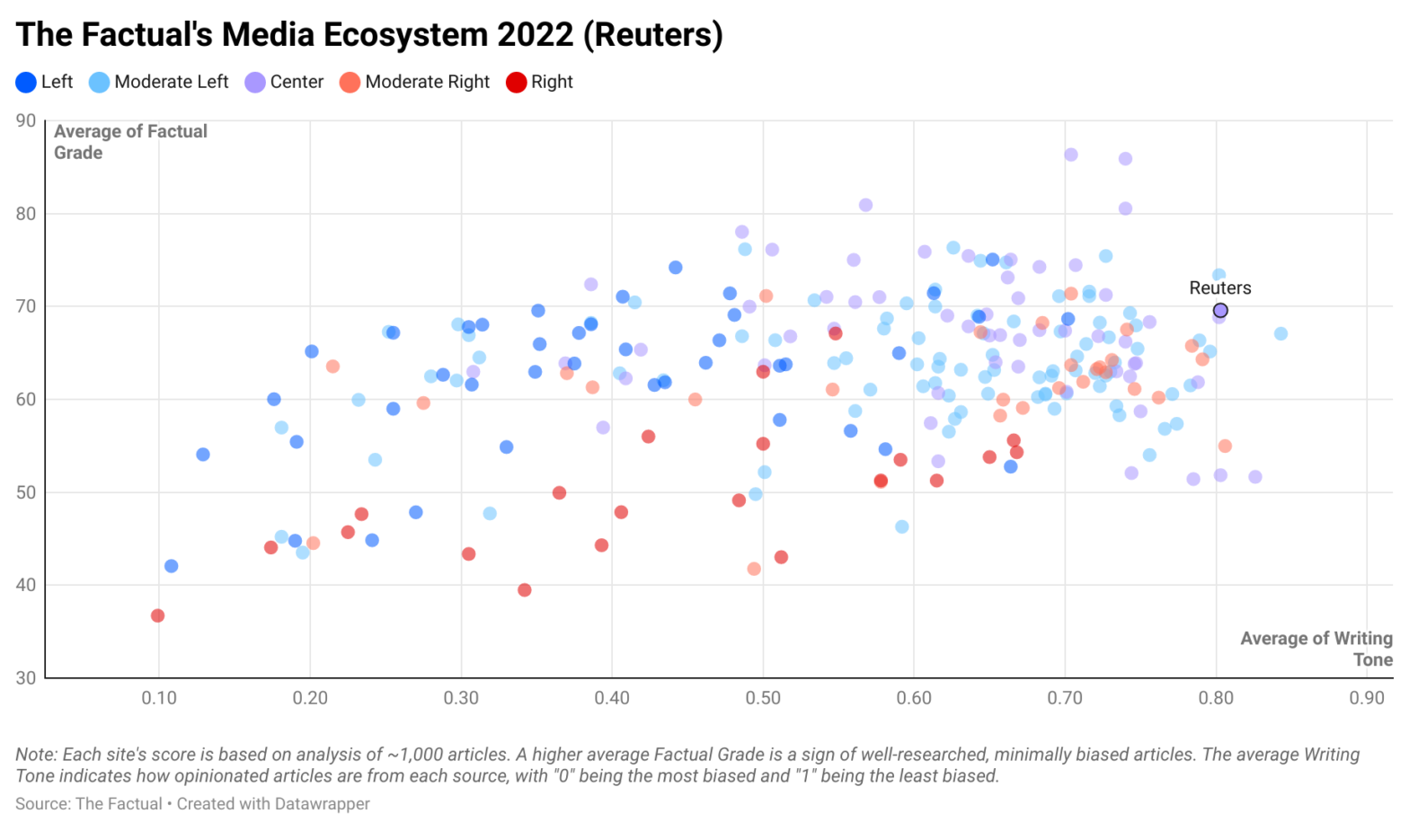Reuters is one of the biggest news agencies in the world, employing over 2,500 journalists. Today, it stands out as a wire service often trusted by publications on the right and left. Given this central position, it’s worth asking two questions: How reliable is Reuters and how biased is its coverage?
How Does The Factual Rate News Sources?
The Factual analyzes more than 10,000 news stories every day to help readers find the most informative, least-biased articles. Our news-rating algorithm scores each article along four metrics: (1) cited sources and quotes, (2) publication history, (3) writing tone, and (4) author expertise. These scores combine in a weighted average we call a Factual Grade, which ranges from 0–100%. (See our How It Works page to learn more about our algorithm.)
For this study, we analyzed ~1,000 articles each from 240 news sources. The average Factual Grade for the entire dataset was 62.5%. Based on these averages, we can compare the performance of news sites across the media ecosystem. The entire dataset can be explored in greater detail here.
How Factual Is Reuters?
Reuters scored an average Factual Grade of 69.8%, placing it in the 82nd percentile of our dataset. These high scores are attributable to the organization’s consistent journalistic practices that involve extensive sourcing and neutral, largely unbiased reporting.
Like any news source, scores for articles from Reuters varied widely based on factors like author expertise and cited evidence. For example, some scored above 80%, while others scored below 50%.
Please check your email for instructions to ensure that the newsletter arrives in your inbox tomorrow.
How Opinionated Is Reuters?
One of the metrics The Factual uses is the Writing Tone, which measures how opinionated the writing is in an article. For this metric, the algorithm looks for signs of subjective commentary (e.g., first person pronouns and unnecessary adverbs), as well as the emotional nature of selected words, and sees how prevalent they are for a given length of text. More neutral text receives higher ratings, with “0” being the most opinionated and “1” being the most neutral.
Reuters had an average Writing Tone score of 0.80, placing it in the 98th percentile of our dataset for this metric. In fact, Reuters achieved the fifth-highest score for any site that we analyzed. This suggests that articles from Reuters are highly neutral in their reporting, strictly conveying information in an objective and unbiased way. This can be seen through headlines such as “Oil up 3% on robust U.S. fuel consumption, tight supply outlook” and “Asset managers to offer fund tokens despite crypto turmoil.”
How Biased Is Reuters?
The Factual classifies news sites by political bias as either Left, Moderate Left, Center, Moderate Right, or Right. This classification comes from third-party assessments from media bias organizations such as AllSides and Media Bias/Fact Check (MBFC). Based on this data, The Factual assigns Reuters a Center bias.
AllSides gives Reuters a “Center” bias, based on survey data, editorial review, and over 28,133 community ratings. However, several recent blind surveys scored the soure as left-leaning. Such a result triggers an editorial review by a bipartisan team.
A review in March 2021 showed Reuters had a “Washington, DC/New York City elite bias in its coverage” but “did not display common types of media bias such as sensationalism, unsubstantiated claims, slant, or omission of source.” The team also noted an anti-Trump bias but, given balanced story coverage, did not think this warranted a change to the bias score.
Meanwhile, Media Bias/Fact Check scores Reuters as “Least Biased,” both for low bias and for highly factual reporting. Stories have “minimal bias and use very few loaded words,” and editors use “minimally biased emotional language in their headlines.”
During the Trump era, for example, Reuters received some criticism of bias, but these cases are rare. Early in the Trump era, the editor in chief noted the need to remain impartial, much as they do around the world. Following the Capital Gazette shooting, a tweet from a Reuters editor placed blame at Trump’s feet; the tweet was quickly removed and labeled as “inconsistent with the Thomson Reuters Trust Principles requiring journalists to maintain freedom from bias.”
Who Owns Reuters?
Reuters is owned by Canadian media conglomerate Thomson Reuters. The Thomson family owns a majority stake in Thomson Reuters through a holding company. David Thomson chairs the holding company and is Canada’s richest person, with a wealth upwards of $40 billion. Overall, there is scant evidence that this ownership structure affects Reuters’ bias or standards.
Please check your email for instructions to ensure that the newsletter arrives in your inbox tomorrow.
How to Mitigate Bias
News articles are bound to have bias because all authors have some frame of reference within which they describe a story. Political bias ratings are helpful in understanding this framing. However, it can be more beneficial to know how factual an article is based on quantifiable metrics that can be seen across the media ecosystem, such as cited evidence, author expertise, and writing tone. This is what The Factual ascertains.
Reading several, highly rated articles from across the political spectrum helps counter the bias of any news source or story. To have the day’s most factual news stories delivered to your inbox every morning, subscribe to our daily newsletter.
This article was updated on September 22, 2022 to reflect new data.

